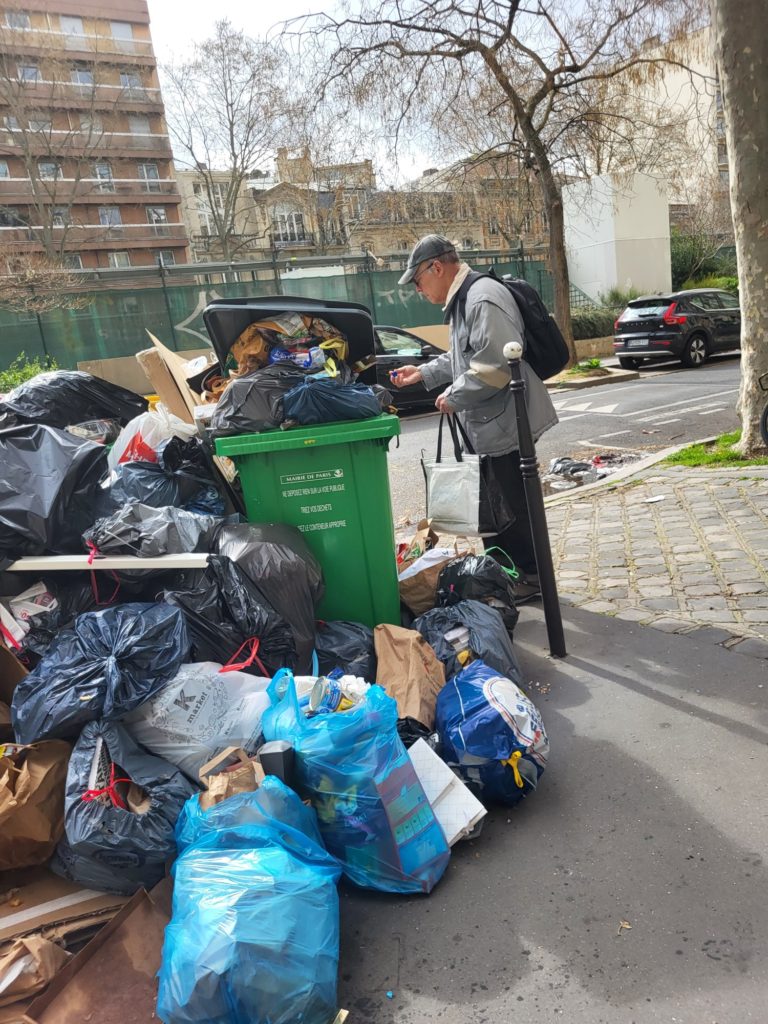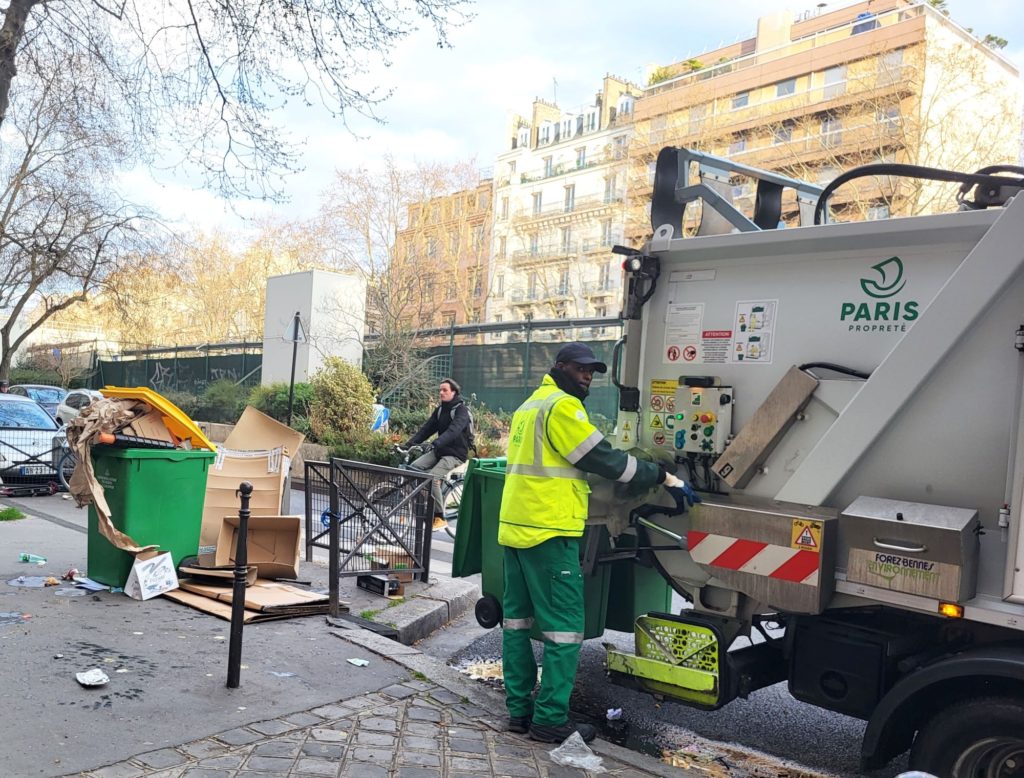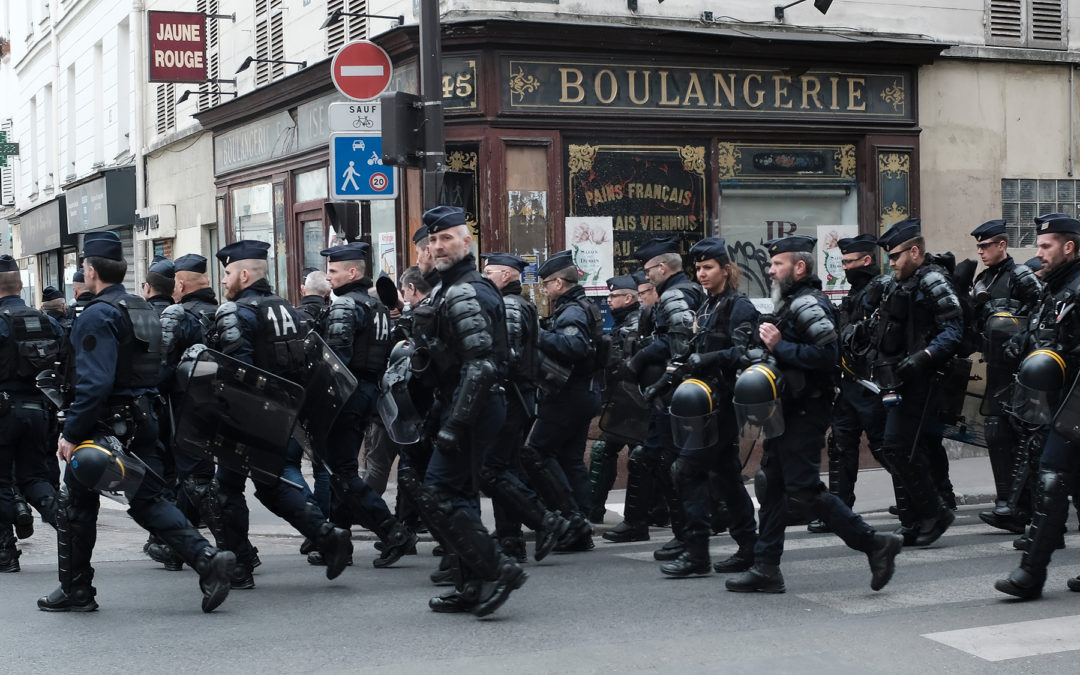During our years in Paris, I’ve always downplayed France’s frequent strike and demonstrations, especially when I’m asked whether people should cancel their planned trips. No, I say.
That’s still true this time around, even though masses of French people are protesting a hike in the retirement age. Ignore those context-free TV images of fires in the streets of Paris, of piles of garbage, of cops wielding truncheons and tear gas. The violence is only at night and only in a few parts of the city. Ditto for Lyon, Marseille, Bordeaux and elsewhere. (We’ll get to the garbage in a bit.) As usual, the committers of violence are mostly agitators, not real protesters.
But this round of confrontations does have a different feel to it.
Those on the street represent a big majority of the French people, not a few angry unions. President Emmanuel Macron’s plan to raise the full benefits age from 62 to 64 is opposed by more than 70% of the population, polls say, even though the law has already passed Parliament (it still must be reviewed by the Constitutional Council.). I previously wrote about it here.
The hundreds of thousands who turn out on scheduled strike days – there have been 10 so far – are determined and motivated. Some are union members, others not. They are also polite, mostly. They bring their children, and at times it can feel like a street party.

Photo: Larry Gassan
At night, it’s another story, and not just on strike days. In some parts of town, mostly the east, groups of black-clad, balaclava-wearing people set fires, break shop windows and throw stones at the police, who either tolerate it or beat them up. John Lichfield explains here why the trend is disturbing. It’s worth nothing that sometimes the police get beat up too.
For Macron, it’s been intensely humiliating: Security concerns caused King Charles III to postpone a planned visit that would have included a state dinner at Versailles – not a good look, frankly – a ceremony at the Place de l’Etoile and a trip to Bordeaux. Charles and his queen consort, Camilla, did do the second half of their trip, to Germany, where they are being received with full honors. Macron must be grinding his teeth.

Photo: Larry Gassan
But he brought much of it on himself. His government has behaved as if it is deliberately trying to anger its constituents. The retirement measure, needed as the population ages, was poorly explained. Then, when it looked as if the lower house didn’t have the votes to pass it, Macron had his prime minister, Elisabeth Borne, ram it though by decree. It was legal, but hardly democratic given the opposition.
In a television interview, Macron essentially ignored protesters’ concerns and boasted about increasing the purchasing power of France’s minimum-wage earners. This at a time when inflation is soaring – food prices are up 14.4% over the last 12 months, for instance. He has been relentlessly tone-deaf throughout the three-month crisis, even by the standards of French presidents. “He is many things, but nobody will ever accuse him of being a political savant,” Chris O’Brien wrote in his excellent newsletter, French Crossroads.
And then there’s the garbage.
Some of Paris’s éboueurs, as they are called, have been striking since March 6, and it shows.

They too would have to retire earlier under the new law, though at a younger age. Now, they can take a pension at 57; it would rise to 59. Then again, garbage collectors tend to start working sooner than white-collar employees, and one can see why they would want to leave that kind of work as soon as possible.
Why only some trash collectors? Because only half of the city’s arrondissements, or districts, have their garbage picked up by public-sector workers. The other half have contracts with private companies. Incredibly, there is little sign that Parisians in trash-strewn districts are dumping their waste across the borders. Meanwhile, Le Parisien reports the private collectors are getting restive as well.
For now, the prefect of Paris – who is appointed by the president — has ordered the collectors back to work and some have complied. This is as opposed to the mayor of Paris, who is a Socialist and has done nothing to get the collections going again.

In a perhaps misguided effort to be good citizens, we kept our trash inside for a while.

This didn’t seem to help much with anything.
And as it happens, our building was one of the few the collectors visited recently. I raced outside with our bags when I saw the truck. Since then, our street has been mostly picked up and the strike has been lifted, though it’s unclear how enthusiastic the éboueurs are about doing the extra work needed to clean up the mess.

The big concern now is that young people, especially students, will take over the demonstrations. A few high schools have been blockaded by students, and in some cases also by their parents, in Paris, and five universities as well. Two to three times as many youth may have participated in the most recent strike day, March 28, as in the previous one, by some estimates.
Young demonstrators care less about retirement than they do about the authoritarian way Macron pushed it through, and about his general reputation as an arrogant elitist. If this becomes a youth movement, it becomes more dangerous for Macron. It’s one thing for police to beat up black-clad anonymous people, it’s another to beat up the children of civil servants and the wealthy.
And it raises memories of May 1968, the beginning of a broad student and union movement that then-President Charles De Gaulle badly underestimated. The crisis was resolved within a year but it indirectly led to De Gaulle’s 1969 resignation – something that Macron must know even though he wasn’t born then.
Many thanks to my visiting friend, Larry Gassan, for the photos! Including the feature image.

So sad in such a beautiful city, great report .
Thank you!
Anne,
as always I read your post with interest but I am going to disagree with a certain number of points. I don’t buy one minute that 70% of the French people are totally opposed to the reform. The current system is bankrupt. At least 14 member countries of the European Union (EU 28) have reformed their pension systems. In Belgium, the legal retirement age will increase to 66 in 2025, as in the United Kingdom.
The reason ? Trying to keep as many people working while guaranteeing a minimum pension. There were four employed workers to finance a retiree in France in 1950. There are only 1.7 left today. In 2018, France had 17.2 million retirees. This figure tends to grow, without the number of active people being able to keep up with the pace, which poses an ambiguity on the financing of future retirements. At a minimum the current opposition to the necessary reform shows a rather poor economic knowledge within the public opinion. Taxing the rich or kicking the can down the road appears to be their only option.
The unions as representatives for the public opinion? The only item they are ready to negotiate was to cancel the entire law and cancel the mandatory age of 64. They had the merit of being clear but this a non-starter as a basis for negotiation.
The 49.3 as antidemocratic? Since 1958, Article 49 paragraph 3 has been triggered 100 times: 33 times by a right-wing head of government, 56 times by the left and 11 times by the current Prime Minister Elisabeth Borne. The absolute record goes to the socialist Michel Rocard (under Mitterand), who engaged the responsibility of his government 28 times, at a time when the use of 49.3 was not limited.
And quid of Les Républicains (Sarkozy and Chirac old party) who pushed a law to change the retirement age to 65 in 1995 if I recall and pull back the project in the face of the public opinion opposition. They could not resolve themselves to support the current project.
I’m not always in tune with the polemicist Yann Moix, but on this one I am. In a recent column, he gave his very clear-cut opinion on the mobilization of the French against the pension reform:
“There is another type of people, the very French people who are against everything by principle: these people are hostile to reform, to any reform whatsoever. Whether it is good or bad for them is of little interest. They are people who, from crisis to crisis, live as perpetual martyrs, never remembering that elsewhere the war is raging and that France, far from manhandling them systematically, more often than not protects them.
It is the people whose neurons would benefit from a little cure for exoticism in Lebanon, for example,or in Brazil. It is the people of the permanent Jacobin lament, that of equality at all costs, who help themselves without ever wanting to help others, who get angry for a yes or for a no, to whom everything is due and who never owe anything to anyone – the brotherhood of the malcontents, which arrogates to itself the monopoly of saying to itself ” we are the people, all the people and nothing but the people”, when it represents only a portion of it.”
Sorry for the rambling.
Jacques
Thanks, Jacques! I am delighted to have your “rambling” as a comment. In fact I changed it to make clear that polls say 70% oppose the reform, which as you say probably means 70% don’t like Macron one way or another. Keep commenting!
Interesting and informative. Thanks, Anne, and good luck to France with all of this!
Thanks, Mary!
Fascinating piece, Anne. Interesting that young protesters aren’t fazed by prospect of having to support elders for 30 years or so, assuming they live into their 90s after retiring at 62. Is there a system like our Social Security, where you can retire at 62 but get bigger monthly checks if you work until 67 or 70?
Yep! And to get a full pension you have to have worked for at least 41 years, so plenty of people do retire after 62 (maybe for other reasons as well, like, they want to). You also can get a full pension after age 67 even if you don’t have the full complement of work years. https://www.la-retraite-en-clair.fr/depart-retraite-age-montant/essentiel-age-depart-retraite/a-quel-age-peut-partir-retraite
Enjoyed the article which was topical and accurate told in a lively style.
Thanks, Kate!
Good article. Good discussion. Thanks, Anne. Also Jacques in particular.
Thank you, Helena!
Great piece, Anne. NYT did a fascinating take on this as well, I’m sure you saw last Sunday, really playing up the class differences between the private-trash-collecting and public-trash-collecting sectors of the city.
Thanks Desson! I hadn’t seen that, I’ll check it out.